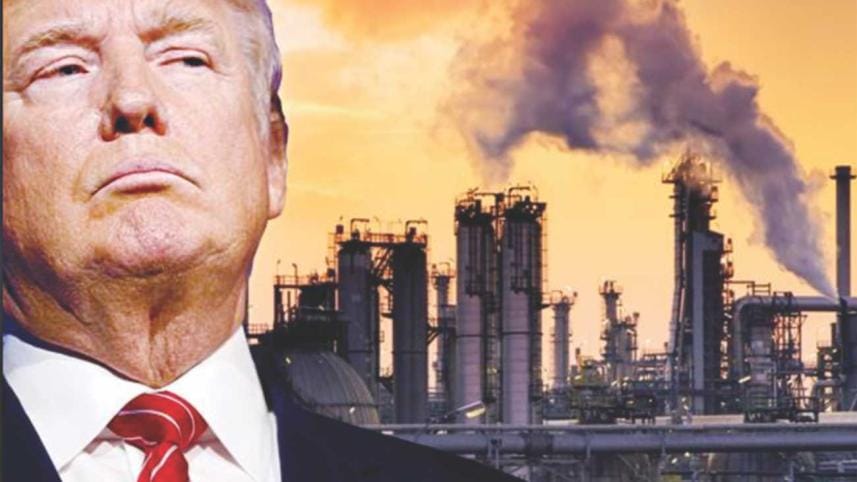A reality check

On June 1 President Trump declared his administration's intention to withdraw from the Paris Agreement (PA). An immediate reaction from countries, such as Bangladesh, Britain, Canada, China, France, Germany, India, Italy and others was to reaffirm their commitments to the PA, a universal accord so assiduously crafted in 2015. It appears Trump's declaration cemented global solidarity behind the cause. His justifications to withdraw appear to fly in the face of reality. This piece focuses on three issues: climate science-policy interface in the US, fairness and climate finance.
First, though climate change is becoming increasingly real, the US had a meandering record in science-policy interface in the last two decades. Fossil fuels invested millions to distort facts. During President Bush' first tenure, climate science had a twist, then led by Exxon, as a result of which the US as the lone holdout never joined the Kyoto Protocol (KP). In his State of the Union Address in January 2007 Bush even recognised for the first time that climate change was a "serious challenge." Then President-elect Obama in his Inauguration Address at the Washington Mall in January 2009 declared his resolve to "restore science in its rightful place." But Obama failed to mobilise public opinion for strong domestic policy. This was reflected in the three US presidential debates in late 2012. For fear of losing votes, neither Obama nor Romney uttered the words "climate change" ever.
The 2016 debates also somewhat reflected the same trend, though Democrat Hillary included climate in her agenda. President Trump claims he "represents Pittsburgh, not Paris," but the irony is that Pittsburgh voters overwhelmingly voted for Hillary, not Trump. Interestingly, though Trump was an avowed denier of climate change during his campaign days, after his election he kept mum about it including his avoidance of denial of science in his withdrawal speech. The latest public opinion poll in May 2017 shows 70 percent of Americans are in favour of staying with the PA. So, it's an irony that the country which supplies the highest number of climate scientists to the Intergovernmental Panel on Climate Change (IPCC) does not have much impact on policy formulation.
Second, Trump asserts the dispensation under the PA is totally unfair to the US, which hamstrings the US and empowers other major emitters like China and India. In hindsight, the same justification back in 1997 was used by the Congress not to ratify the KP. It had a top-down approach internationally, which the US always viewed as erosive of its sovereignty. This was evident in its refusal to join the League of Nations a century ago (brainchild of the visionary leadership of President Wilson). However, the PA is a voluntary, bottom-up process, where countries themselves pledge national contributions to emissions reduction, only to be reviewed every five years. Non-compliance entails no penalty, just peer pressure. This design was the brainchild of America and the world accepted it. Then, how can such a voluntary, gentleman's agreement condemn the US to "potential liability of billions of dollars"? On the contrary, US withdrawal, as Saleemul argues, will push the US onto the liability scaffold.
Thus the fairness argument by Trump is misleading, and not grounded in reality. China with more than 18 percent of global population now emits almost double that of the US, but in terms of per capita Chinese emission is still one-third of the US. The case of India, with over 17 percent of global population, is more challenging. Though it is the third largest emitter, on per capita its emission is one-tenth of the US. India's per capita income is just 3-4 percent that of the US, and about 400 million citizens have no access to modern energy. Still, both countries have already massively invested in renewable energy, which will allow them to comfortably live by their commitments under the PA. In terms of historical emissions, US is the largest contributor with 30 percent against China's 8 percent. This is the reason why even Bush Sr agreed under the Climate Convention in 1992 that developed countries must lead and act first.
Third, Trump asserts the US will be forced to shift "billions and billions and billions of dollars" to the Green Climate Fund. This is an exaggeration, which to date stands at just USD 1 billion, against a pledge of USD 3 billion for four years. So far 43 including 9 developing countries have committed to GCF a total of USD 10.3 billion. Of this EU countries pledged almost half. On per capita US pledge ranks 11th and as share of GDP, it is 32nd among 43 countries. Trump argues that all this money is in addition to US's "massive" development assistance. This is again not right. While several developed countries contribute well over 0.7 percent of their GDP for such assistance, US provides a paltry 0.17 percent.
Further, America continues to subsidise fossil fuel production by about USD 25 billion a year, where most of the developing countries subsidise energy consumption mainly for the low-income people. Still 40 countries of the world have introduced carbon pricing, the cardinal solution to arrest climate change. China already introduced carbon trading at the state level, with a plan to upscale nationwide by mid-2018. About 100 countries have indicated in their submitted Intended Nationally Determined Contributions (INDCs) the willingness to join any international carbon pricing mechanism. Kerry, former US Secretary of State who helped cobble up the PA, asserts that US efforts at state and city levels will greatly contribute to its pledge of reducing emissions by 26-28 percent by 2025, compared to the 2005 level.
Thus, at a time when coal is facing national and international censure, with its demand slowed to a crawl, when the China-led Asian Infrastructure Investment Bank decides not to fund coal-fired plants, when the world struggles to move along a low carbon trajectory, President Trump takes his country back to the nineteenth-century dirty energy pathway. Many analysts including this author believed that Trump being a pragmatic businessman would read the energy market trend, but his policy belies all rational expectations. This might be the reason Trump's Secretary of State Tillerson, former Exxon CEO and now a convert to climate science, is keeping mum, feeling that such wholesale abdication of global leadership by his boss may not make America great again.
The writer is Professor, Environmental Management, North South University.
Follow The Daily Star Opinion on Facebook for the latest opinions, commentaries and analyses by experts and professionals.




 For all latest news, follow The Daily Star's Google News channel.
For all latest news, follow The Daily Star's Google News channel.
Comments